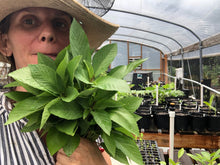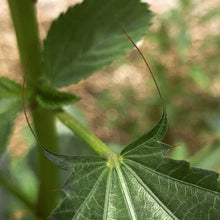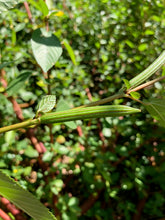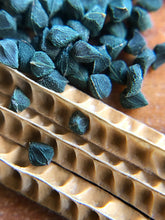Molokhia
Regular price
$4.00
Sale
Corchorus olitorius
Origin: Africa/Middle East/South Asia, via North Florida
Improvement status: Landrace
Seeds per packet: ~250
Germination tested 10/2025: 95%
Life cycle: Annual
If you want easy, no fuss greens and have room for a small annual shrub, grow this plant! Mokokhia is most well-known as a Middle Eastern super-green, also known as Jew's Mallow or Egyptian Spinach. It is widely grown from Southeast Asia to Africa, the likely site of its domestication. Leaves are rich in beta carotene, iron, vitamin C, and antioxidants. This “food of kings” dates back to the time of the pharaohs, when an Egyptian king drank it in soup to recover from illness. Today, it’s one of the most widely eaten vegetables in Egypt. In the Philippines, it is called "saluyot" and is widely grown for its leaves. It can be used as you might use spinach, but the plant is far more productive and easy to grow over a long season. A few plants will provide loads of fresh greens all summer.
We got this seed from our friend Melissa DeSa of Working Food in Gainesville, Florida, a wonderful non-profit focused on seeds, food, and community-based economic development. Here's what she has to say about these seeds:
"Our friend Michael Adler from the Edible Plant Project received the seeds from a couple in Texas that had been growing them and saving them for a while. We got it from them in about 2012 and have been keeping them ever since. The Edible Plant Project was not able to continue their seed program which had collected some interesting, unusual and adapted plants for our region, so we are happy that we could keep them not just alive, but distributed and celebrated locally.
Working Food has a community seed collective program that grows, shares and educates the community about regional seeds and seed-keeping practices. The seeds were last grown at our seed preservation gardens here in Gainesville, Florida at Grow Hub — a partner non-profit nursery that provides employment and opportunities for adults living with disabilities. They help us in all aspects of our seed production from growing to packing and labeling the seeds! We work with a small network of home gardeners and a few farmers to help us trial and grow our seeds as well.
Molokhia is very easy to grow and provides nutrient-dense leaves that are easy to incorporate into your day-to-day meal prep. Locally saved by Angie Minno, Becca Huy, and us at Grow Hub!
Growing Tips for North Central Florida: Sow 1/4” deep, spaced 18 inches apart or more. We have started them as seedlings to transplant outdoors, but it also self-sows in the garden if left to go to seed, and so direct sowing into your soil is also great! Cody at Siembra Farm has had this come up on its own after letting a field of it go to seed. This plant does not appreciate cold so we don't send her outdoors until we're sure frost is gone, usually around April. Plant outdoors April-July. In our gardens, it has reached about ten feet tall. It responds well to trimming as it will bush out even more branches and leaves. Becca successfully grew them in huge pots, we grow ours in-ground.
Seed Saving Tips: Easily produces seed, and scatters them around too. Long green pods stay that way for some time. But they seem to dry and split quickly, which makes them susceptible to rot and spoiling if rained on once they've started drying and opening up. Check daily for ripening pods and gather as they mature. Each pod bears loads of tiny, gorgeous turquoise seeds. If stored well, the seeds last a very long time. As with all seeds, dry them as much as possible (this is more important than keeping them cold!) and keep stored in a sealed container where it is can be cool, dark, dry and stable. We have had 6-year-old seed kept well still have 99% germination rates.
Cooking Ideas: We’ve found that when cooked, it has the consistency of okra, but not when fresh. It's also been referred to as okra tree for this quality. The silkiness it provides in cooking works great for soups and stews. The seeds can be used as flavoring and an herbal tea is made from dried leaves. There are quite a few great recipes on the web for Molokhiya, most frequently as a traditional African soup. They are delicious! Our seed steward and friend Angie Minnow has a great recipe on her blog for a Cheese, Chicken & Egyptian Spinach Pie! Yum!"
Thanks Melissa! We're excited to be offering seeds for this wonderful, treasured plant.








